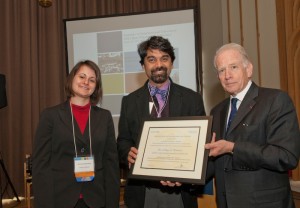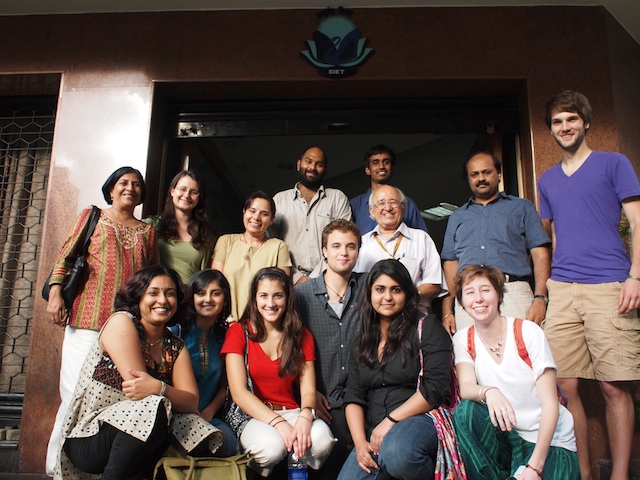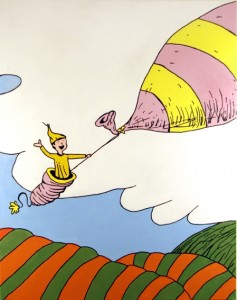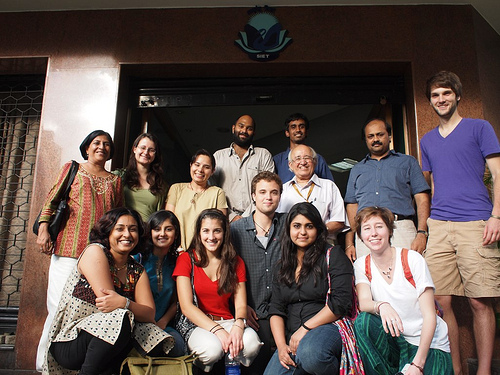The College of Wooster’s Global Social Entrepreneurship (Global SE) program was cited for excellence by the Institute of International Education (IIE). IIE, which also administers the Fulbright program, honored Global SE with the Andrew Heiskell Award for Innovation in International Education — specifically internationalizing the campus through business education — at the Sixth Annual Best Practices in Internationalization Conference on March 18 in New York City.

Co-Founders: Marianne Sierocinski and Moledina recieve award from Dr. Goodman, President of IIE.
Designed by-and-for students, alumni, staff, and faculty, Wooster’s Global SE program promotes global citizenship and social entrepreneurship. “It provides a life-changing international experience for students who are actively involved in the planning and implementation of the course development and entrepreneurial experience,” said Amyaz Moledina, co-architect of the program as well as assistant professor of economics and co-director of Wooster’s Center for Diversity and Global Engagement. “Student participants gain a rich appreciation of the global issues that are facing social enterprises in both the U.S. and India. Those who have completed the program have taken what they have learned and innovated. Examples include a student that began documenting the conditions of migrant farmers in North Carolina, a student that decided to work in a rural eye hospital in India, and a student who used what learned in her own nonprofit in Ghana. Other participants have designed majors around global international development and social enterprise solutions.”

Global SE Students, CSIM Staff and Board, SEOP Course Graduates outside SIET
Erika Takeo, a sophomore from Portland, Ore., said she wanted to be a part of the program because of its hands-on approach to learning. “It is not simply a class where you show up, take notes, and study for exams,” she said. “As in any case where you are working for social change, you must engage completely with the issues and people you are trying to help.”
Marianne Sierocinski, a senior urban studies major from Davie, Fla., said that one of GSE’s major strengths is its structure as a student-driven initiative. “The experience empowers us to embrace ambiguity, take risks, and think creatively in the face of complex challenges,” she said. “It was an incredible learning opportunity for me to contribute so tangibly to the program’s development, transforming a business plan I helped write in 2009 into a program I participated in this past summer.”
The program has two primary components: an on-campus seminar in the spring and a six-week experiential-learning association with social enterprises in Bangalore, India, in the summer. This past year, the group collaborated with Dream a Dream, an internationally recognized Indian organization that works with underprivileged children to inculcate life skills. Another team of three students also worked with EnAble India, an organization that provides innovative training and placement services to Fortune 500 companies for people with disabilities.
The objective, according to Moledina, is not only to provide experiential learning opportunities to train the next generation of global social entrepreneurs, but also to be of value to client organizations. “Most programs of this kind are engaged with organizations for short periods,” he said. “We try to work with these organizations over a longer period of time. Each year, a new group of students takes over where the previous group left off. Were it not for our partners like the Center for Social Initiatives and Management, Experiential Travels, Sattva Consulting, and other social enterprises and individuals like Lilly Paul and Sampath of Arpitha who we worked closely with in Bangalore, we would not have been a success. Even more strongly, our alumni such as Jairaj Daniel, showed early support and were instrumental in ensuring we succeeded and continue to thrive. Our business model is based on collaboration, and awards like this indicate that Wooster’s program is distinctive.
“Business education is unusual at liberal arts schools,” added Moledina. “Even more so, a multidisciplinary approach to problem solving that welcomes students from a range of majors, such as international relations, communications, math, economics, and sociology is equally unique.”
IIE President and CEO Allan E. Goodman indicated that this year’s Heiskell Award winners represent some of the world’s best initiatives in internationalizing higher education. “As institutions continue to innovate, taking their internationalization efforts to new heights and depths, we look forward to continuing our tradition of recognizing their commitment to excellence and meeting the global mandate of our time,” he said.
The Institute of International Education awards are designed to promote and honor the most outstanding initiatives in international higher education by IIE Network member universities and colleges. In recognizing excellence and innovation, the Institute hopes to support them in their endeavors and to signal a new and important role for international education on campus.
“Global SE is an innovative program that embraces our core values and enables our students to realize their full potential as engaged scholars and global citizens,” said College of Wooster President Grant Cornwell. “It also prepares them to make significant contributions to our complex and interdependent world.”
Alumni Trustee Sandeep Bhatia added, “It is an honor for Wooster to be recognized for what it has done best since its founding: putting students and faculty together to understand complex issues. Global SE is a new model that seeks to integrate staff and alumni minds together with Wooster’s core competency of student-faculty collaboration in the direction of entrepreneurship for the global good.”











